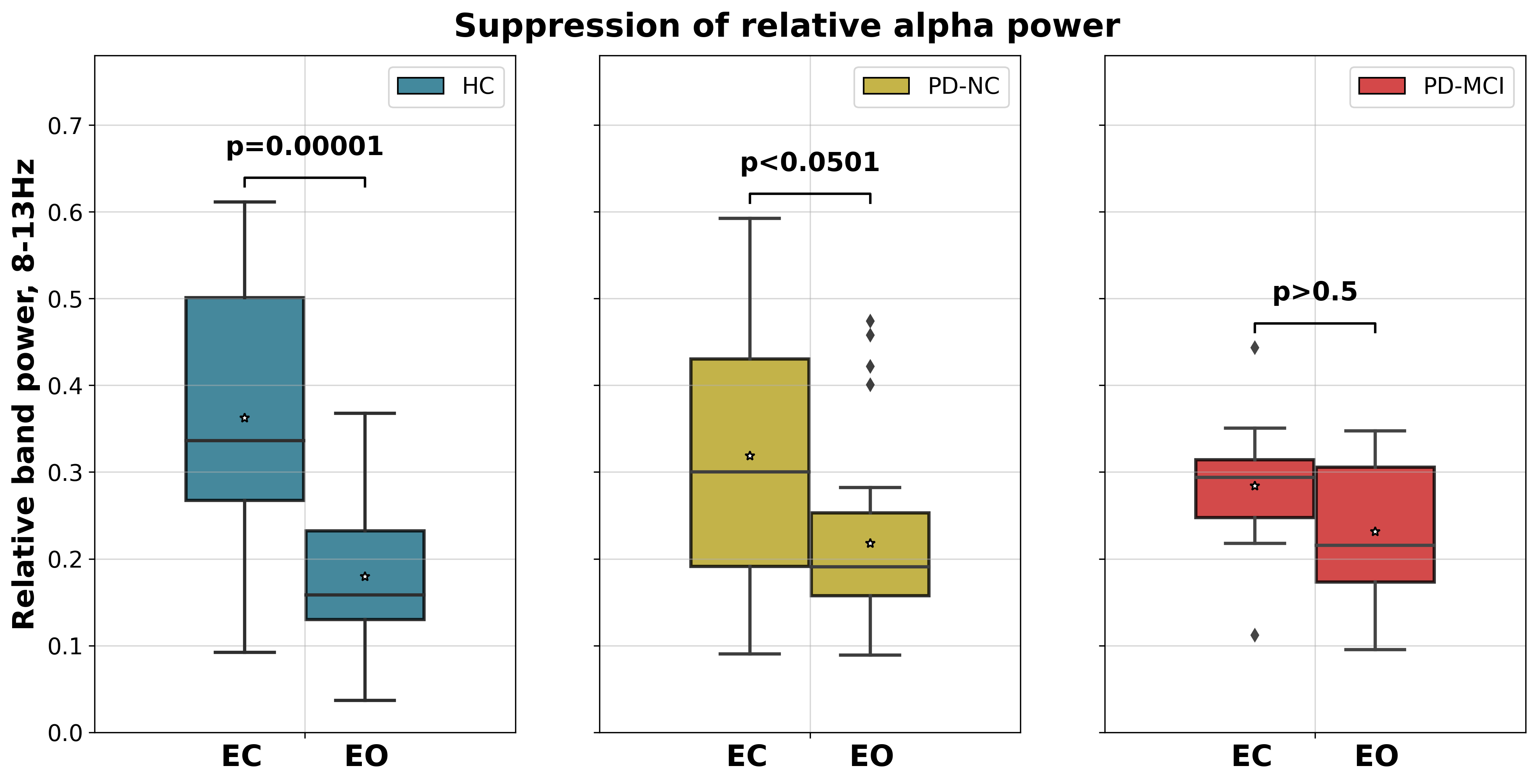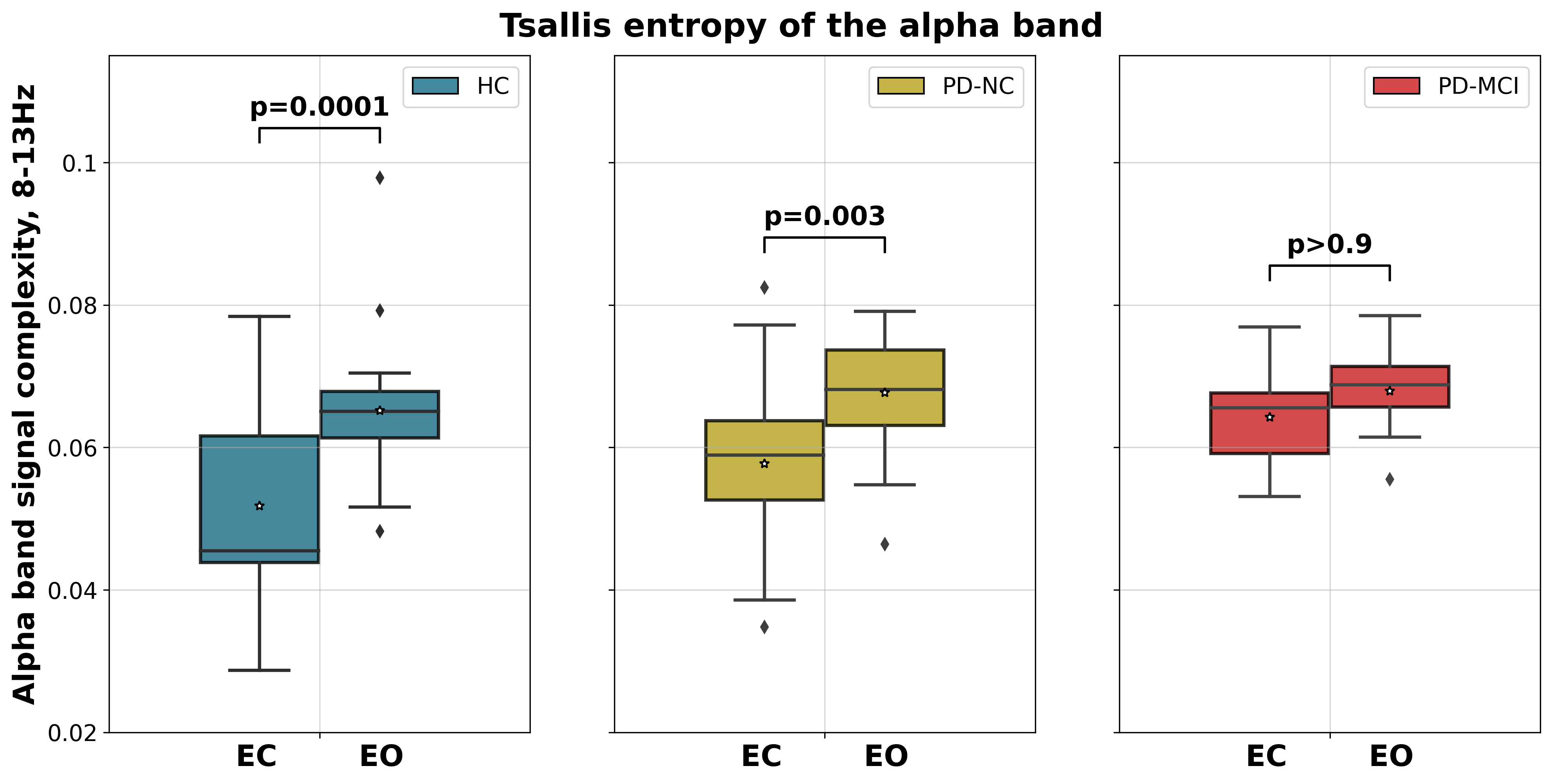Category: Parkinson's Disease: Cognitive functions
Objective: In a cross-sectional setting both alpha suppression and complexity of alpha-band oscillations are evaluated as diagnostic biomarker for assessing MCI in early stages of PD.
Background: Background activity, consisting in the majority of healthy humans in alpha-band oscillatory activity (8-13 Hz), is present during eyes closed (EC) condition but is suppressed when eyes are open (EO). Alpha oscillations have an important role in attentional processes. In PD, cognitive decline may be accompanied by pathological levels of attention. Therefore the state of mild cognitive impairment (MCI) in PD, which is a transitional state between normal cognition (PD-NC) and overt dementia (PD-D), is hypothesized to exhibit abnormal behaviour compared to healthy controls or PD-NC patients.
Method: 24 healthy controls (HC, 9 females, medians: age 66.5 yrs., edu. 14 yrs.) and 31 PD-NC individuals (14 females, medians: age 69.0 yrs., edu. 14 yrs., UPDRS 15, LED 490.0, disease duration 32 mos.) were compared with 8 individuals diagnosed with PD-MCI matched for age, sex and education (3 females, medians: age 65.5 yrs., edu 16 yrs., UPDRS 15.5, LED 784.5, disease duration 50 mos.). High-density EEG recordings were obtained during eyes open (EO) and eyes closed (EC) condition. Signal complexity, quantified based on Tsallis entropy (TE) [1], as well as relative band power (rBP) were evaluated for the alpha band. The resulting signal complexity and band power values were then compared across groups where grouping was based on an individuals’ diagnosis.
Results: Evaluation of rBP during EC and EO condition showed significant or close to significant intra-group differences for HC (p=0.00001) and PD-NC (p<0.0501) but not for PD-MCI (p>0.5), see fig. 1. Alpha band signal complexity is increased in EO condition across all groups compared to EC. While the PD-MCI group exhibited a non-significant increase (p>0.9), HC and PD-NC showed significant differences (HC: p=0.0001 and PD-NC: p=0.003), see fig. 2.
Conclusion: PD-MCI may manifest in the alpha band (8-13 Hz) through impaired ability to perform alpha suppression and through increasingly similar levels of signal complexity between EC and EO condition. The results apply to groups with an alpha background activity, and may help to define study populations for clinical trials, but cannot be applied in their present form for individual treatment decisions or counseling.
References: [1] Sneddon R. The Tsallis entropy of natural information. Physica A Statistical and Theoretical Physics 2007; 386: 101–118.
To cite this abstract in AMA style:
S M. Keller, A. Meyer, U. Gschwandtner, S M. Beltrani, K. Toloraia, P. Fuhr. Reduced Alpha suppression & altered EEG signal complexity in Parkinson’s disease – signatures of cognitive impairment? [abstract]. Mov Disord. 2021; 36 (suppl 1). https://www.mdsabstracts.org/abstract/reduced-alpha-suppression-altered-eeg-signal-complexity-in-parkinsons-disease-signatures-of-cognitive-impairment/. Accessed December 18, 2025.« Back to MDS Virtual Congress 2021
MDS Abstracts - https://www.mdsabstracts.org/abstract/reduced-alpha-suppression-altered-eeg-signal-complexity-in-parkinsons-disease-signatures-of-cognitive-impairment/


